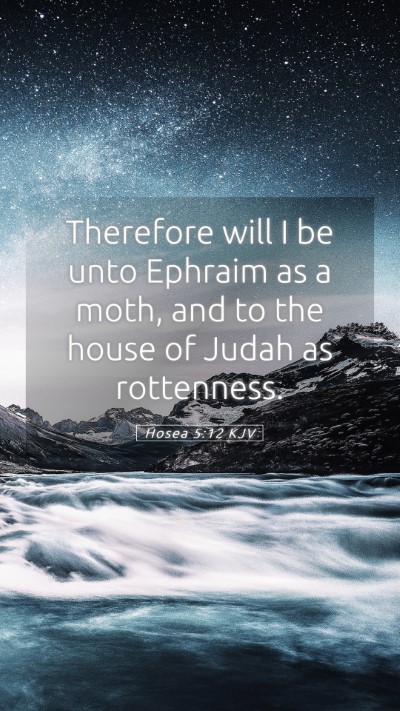Old Testament
Genesis Exodus Leviticus Numbers Deuteronomy Joshua Judges Ruth 1 Samuel 2 Samuel 1 Kings 2 Kings 1 Chronicles 2 Chronicles Ezra Nehemiah Esther Job Psalms Proverbs Ecclesiastes Song of Solomon Isaiah Jeremiah Lamentations Ezekiel Daniel Hosea Joel Amos Obadiah Jonah Micah Nahum Habakkuk Zephaniah Haggai Zechariah MalachiHosea 5:12 Meaning
What is the meaning of Hosea 5:12?
Therefore will I be unto Ephraim as a moth, and to the house of Judah as rottenness.
Hosea 5:12 Bible Verse Meaning
Understanding Hosea 5:12
Hosea 5:12 states: "Therefore will I be unto Ephraim as a moth, and to the house of Judah as rottenness." This verse has deep implications within the context of divine judgment and the consequences of sin. Below, we explore the interpretations and meanings of this verse, drawing insights from various public domain commentaries.
Bible Verse Meanings and Interpretations
The central metaphor in this verse is that of a moth and rottenness, both of which signify decay and destruction. God speaks through the prophet Hosea about the judgment that will come upon the Israelites due to their unfaithfulness.
Contextual Background
Hosea prophesied during a time of great moral and spiritual decline in Israel. The nation had turned away from Yahweh, engaging in idolatry and immorality. God’s message through Hosea is one of warning and impending judgment, emphasizing the seriousness of their sins.
Commentary Insights
- Matthew Henry: He highlights that the destruction will be gradual, comparing it to a moth that slowly consumes fabric. The house of Judah, though not as overtly sinful as Ephraim, will also face repercussions for their failure to uphold God’s covenant.
- Albert Barnes: He elaborates on the implications of the moth, indicating that while the destruction may not be immediate, it is nonetheless inevitable. Barnes stresses that God will allow their ways to lead to their downfall, emphasizing the certainty of divine retribution against sin.
- Adam Clarke: Clarke views the moth as a symbol of the subtlety of divine judgment. He notes that rottenness signifies a complete failure and breakdown, saying that God’s judgment can often operate under the surface before becoming visibly apparent.
Spiritual Significance
This passage serves as a poignant reminder of God's holiness and justice. The decay represented in the verse illustrates the destructive nature of sin. The primary takeaway from this verse is the theme of accountability, warning believers of the far-reaching consequences of turning away from God.
Application of Scripture
For contemporary believers, Hosea 5:12 offers vital lessons on the importance of spiritual vigilance and faithfulness to God. The gradual decline signified by the moth and rottenness cautions individuals against complacency in their spiritual lives. It encourages repentance and a return to committed faith, reinforcing the idea that neglect of spiritual duties can lead to inevitable consequences.
Bible Study Insights
For those studying the Bible, this verse encourages deeper contemplation on the nature of sin and its effects. Understanding this scripture can enhance one’s appreciate for the overarching themes in Hosea, which include love, judgment, and mercy:
- Historical Context: Study the socio-political situation of Israel during Hosea’s time for a fuller comprehension of the implications of divine judgment.
- Biblical Exegesis: Analyze the choice of words and metaphors used by Hosea to convey God's messages.
- Life Application: Reflect on personal areas of life that may be vulnerable to spiritual decay, drawing parallels to the message conveyed in this verse.
Cross References
Hosea 5:12 can be cross-referenced with the following passages, which further elucidate themes of judgment and the consequences of sin:
- Amos 4:6-12: This passage discusses Israel's failures and God's consequent judgments.
- Isaiah 50:9: It speaks of how God’s judgment will manifest against those who oppose Him.
- Revelation 3:17: This text warns about spiritual blindness and the need for repentance, reflecting similar themes as Hosea.
Conclusion
In conclusion, Hosea 5:12 serves as a profound reminder of God's holiness and the inevitable decay faced by those who stray from His commands. Through this scripture, believers are called to maintain faithfulness and reflect on the seriousness of their spiritual commitments. The insights provided by public domain commentaries enrich our understanding of Bible verse meanings, interpretations, and applications in both historical and contemporary contexts.


